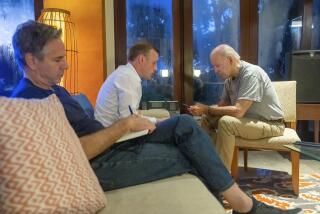Soviets Flexible, Reagan Tells Allies : Gorbachev Seemed to Passively Accept ‘Star Wars’ Research, NATO Is Told
- Share via
BRUSSELS — President Reagan told leaders of NATO countries here Thursday that the Soviet Union appears to have passively accepted the American research program on space defense and that he found Soviet leader Mikhail S. Gorbachev much more flexible and open to compromise than he expected.
In a brief stopover at NATO headquarters on his way back to Washington from his Geneva summit with Gorbachev, the President found unanimous warm support for what West German Chancellor Helmut Kohl later called “the opening of doors, a new basis for East-West relations” achieved at the summit.
Heads of government of 13 of the 16 North Atlantic Treaty Organization members came to Brussels for the presidential briefing, which lasted only an hour and 20 minutes.
Three Stayed Away
The three who stayed away were President Francois Mitterrand of France, Prime Minister Andreas Papandreou of Greece and Prime Minister Felipe Gonzalez of Spain. Each pursues a somewhat maverick policy toward NATO and relations with the United States. Their foreign ministers attended Reagan’s briefing here.
On the question of research on Reagan’s proposed Strategic Defense Initiative, popularly called “Star Wars,” one of the participants in the meeting, speaking on a not-for-attribution basis, said the President has the feeling that Gorbachev now accepts the fact that the research program will not be stopped.
The President was quoted as telling Gorbachev that he will keep the Soviets informed about the space-based missile-defense program as it progresses and will do nothing that exceeds the limits of the existing Anti-Ballistic Missile Treaty.
This, however, does not in any sense mean that the Soviets have dropped their opposition to SDI, the source said, merely that Gorbachev, being a realist, now presumably accepts the reality that the program will continue to move forward.
“Our reading is that they have passively accepted the SDI research program, or they would not have signed the final statement in Geneva,” this government head said.
Opposed to SDI
However, Gorbachev himself told reporters in Geneva after the President’s departure that he had made clear to Reagan that the Soviet Union will not cut its nuclear strike force until the United States drops “Star Wars.” He emphasized that the proposed U.S. defensive system threatens world peace and would trigger an arms race in space if it was deployed.
The President arrived at NATO headquarters under overcast skies as damp snow flurries blew across Brussels. The session, presided over by Britain’s Lord Carrington, the NATO secretary general, began after brief handshakes and greetings.
Reagan spoke for 20 minutes. Other heads of government then responded briefly with comments or questions. After back and forth discussion, the meeting ended. Half an hour later, the President was airborne for Washington.
Although those who briefed reporters afterwards said that “there were no surprises” in what the President had to report, all made clear that they felt it had been worth the trip to Brussels to hear about the Geneva outcome promptly and firsthand, particularly in view of the upbeat report the President made.
‘Constructive’ Meeting
“It was very constructive and there is a new basis of confidence in the future. We are all well pleased,” British Prime Minister Margaret Thatcher said. “The President has all our congratulations and support, and in particular our appreciation of the personal effort he made to come here. He got an excellent reaction.”
Italian Prime Minister Bettino Craxi said that Reagan told his NATO colleagues that he found Gorbachev “far more reasonable” than he had expected and that the most important outcome of the Geneva meeting was the fact that he now had someone in the Soviet Union with whom he could develop a dialogue.
More to Read
Sign up for Essential California
The most important California stories and recommendations in your inbox every morning.
You may occasionally receive promotional content from the Los Angeles Times.













